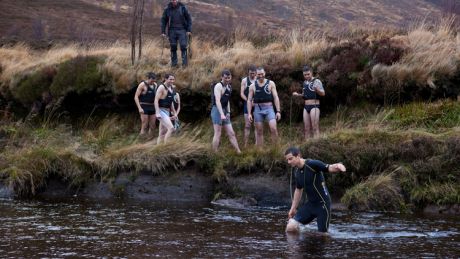Have you got what it takes to survive in the wild?
Are you man enough to survive Bear Grylls’s gruelling boot camp, developed to push your physical and mental strength to their limits?

Ex Royal Navy trainer Scott Heffield challenges you to take on the ultimate test of your toughness, and tells you what to do if you ever get stuck in a survival situation.
Tell us about the course.
Bear Grylls and I put the course together. I was a fitness instructor in the Royal Marines, and I’ve worked with Bear on his TV shows, as a stunt co-ordinator. We made the courses like the shows. It’s not a bush-craft course or a bootcamp, it’s somewhere in between.
How challenging is the course?
Perhaps men have become a bit soft. The course says to men: are you really tough? You might be able to do weights and a cross-training sessions, but have you got functional skills; can you run, jump, scramble, dive, and swim? We go back to basics - Neanderthal, man skills, like preparing your own food and fire-lighting. You might be fit and strong, but have you got the mental and physical toughness to stay out in challenging environments? There’s not a dumbbell or a machine in sight. It’s all about lifting logs and scrambling across a lake thigh-deep in mud.
What are the most important things you need to do to survive if you’re lost in the wilderness?
The best way to remember what you need to do is the mnemonic Please Remember What’s First.
The P is for protection; the first thing to get is protection from the elements. Do anything to get you out of the wind and the rain. If you’re caught in the snow, you could dig a snow grave to keep warmer.
The R is rescue. If no-one knows where you’ve gone, you’ll have to rescue yourself. You have to make difficult decisions, like whether to swim across a river or climb up a rock face. Don’t try to survive for weeks in the wilderness – just survive for the few hours you need to find help for yourself.

W is water. You can only survive for three days without water, so you might have to take a risk and drink dirty stuff. If there’s a river you should drink from that, but if not there are other methods. You could do a solar still, which involves digging a hole in the ground and putting a sheet of plastic across with a weight in. You can collect mosses and grasses and wring them out, or walk through the dew on the grass and wring your trousers out. A condensation trap – a simple plastic bag wrapped tightly around a tree branch – is another desperate measure for water.
Get the Coach Newsletter
Sign up for workout ideas, training advice, reviews of the latest gear and more.
F is food. Some people think you should eat mushrooms, but you can’t - some are poisonous. We have maggots and earthworms, and we eat them live. You shouldn’t waste any vital calories hunting. Forage instead, by lifting up rocks, pulling up bark and eating woodlice or worms. A mealworm pound for pound has more protein than steak, so no more protein shakes after the gym.
Are there any everyday applications of survival skills?
A lot of the skills you need to survive in a hostile environment are also useful in a more day-to-day situation. The ability to navigate is an important ability wherever you are. You don’t even need a compass – you can just point the hour hand of your watch at the sun. The direction halfway between the hour hand and twelve o’clock will be south. It’s also quite an accomplishment to be able to catch and kill. It’s great for barbecues when you know how to skin rabbits and cook them on the fire. Once you know that you crush the stinging fibres when you grab nettles aggressively, you can start chewing them whenever you see them. They’re full of Vitamins C and D.
What’s the difference between the gym and the survival environment?
The key difference is what we call functional fitness – using the same workouts you practise in the gym in a more practical context. You might be able to do over-arm pull-ups, but can you get from branch to branch on a tree, using the same muscles but in a more usable way? Can you lift, climb, and drag real things? Can you do it when you’re wet, cold, hungry, and when you need to? Are you really determined? Are you really fit? Are you a proper man?
The Bear Grylls Survival Academy Instructor Course is an intensive three-day taking place in Surrey. It teaches everything from self-protection, stalking and survival techniques to foraging, astro-navigation and river crossings. For more information visit beargryllssurvivalacademy.com or call +44 (0) 1483 424 438
